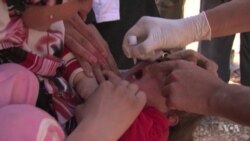There are only two places in the entire world where children have caught polio this year: Afghanistan and Pakistan. In these countries, the virus is not circulating throughout, but only in very remote or very small areas.
Nearly 30 years ago, the polio virus paralyzed 1,000 children a day in 125 countries.
The numbers have dropped so dramatically thanks to a global effort to wipe out the polio virus.
Carol Pandak of Rotary International calls the effort "herculean." “Hundreds of thousands of frontline health care workers are out there every day immunizing children in urban areas, in remote areas, in all sorts of settings," Pandak says.
Rotary International was the first organization to promote the global effort to end polio. It has since become a partner in the Global Polio Eradication Initiative (GPEI), which includes the World Health Organization, the U.S. Centers for Disease Control and Prevention, UNICEF and the Bill & Melinda Gates Foundation.
At one time, health workers in some countries risked their lives to immunize the children. Pandak says the vaccinators are now people from the communities they work in which has helped alleviate some of the safety issues. In areas of conflict, Pandak says security personnel accompany them.
Dr. Flavia Bustreo at the World Health Organization says the challenge now is to get to zero cases and to maintain that level for at least three years, just to make sure the virus is no longer circulating. The key to that, she says, is strong surveillance so every single case is detected and children are immunized.
The GPEI has developed a network of laboratories around the world that can identify the disease. Maintaining these laboratories and the cost of distributing the vaccine is both a huge undertaking and an enormous expense.
The polio virus is a disease that is only found in humans. It doesn't infect animals, which is why it can be eradicated.
Dr. David Nabarro at the UN says getting to the end is actually the hardest part of the campaign because governments and organizations have to keep up their commitment until there are no more cases. "We've got to remain vigilant and focused until the last case has been found and that we have got everybody protected."
Once the final case of polio is recorded, it will take three years to ensure that the last case is, in fact, the final one. That means that if the final case is seen this year, all of these programs will continue to need funding and volunteers until 2020. That's why the theme of this year's World Polio Day is “We’re Not Done Yet.”





